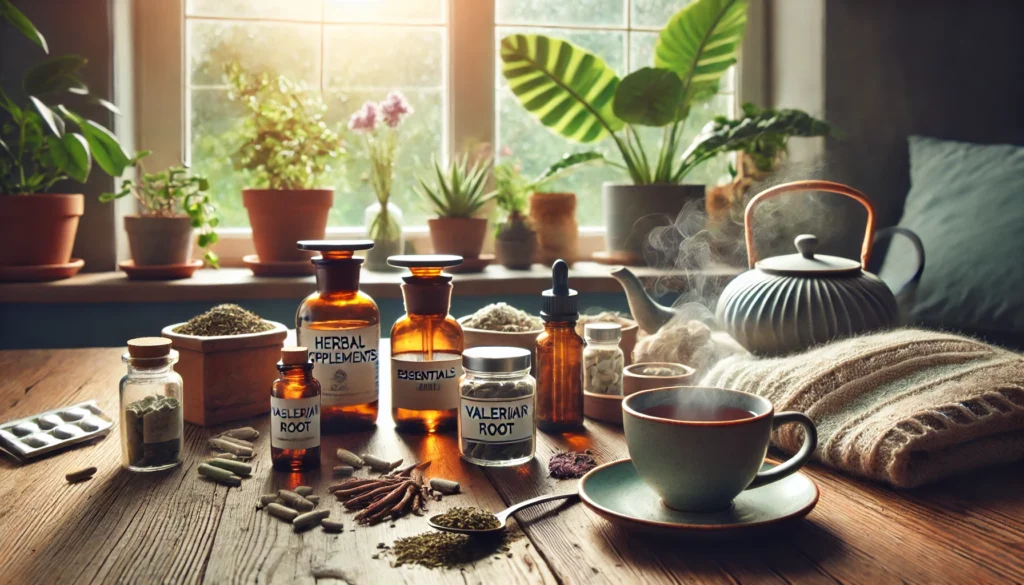In today’s fast-paced, digitally driven world, stress and depression have become increasingly common experiences. Although these mental health challenges affect individuals differently, they share overlapping roots in both physiological and psychological realms. For many, conventional treatments such as therapy and medication can be highly effective. However, a growing number of people are exploring complementary strategies that align more closely with natural health philosophies. Understanding how to tackle stress and depression naturally opens up avenues that include herbal remedies and holistic supplements, which may offer additional support in the journey toward mental wellness.
You may also like: Best Herbal Alternatives to Anxiolytics: Natural Remedies for Anxiety Relief
The need for alternative or complementary methods is not born out of skepticism of modern medicine, but rather from a holistic view of health that integrates mind, body, and spirit. As we delve deeper into these natural approaches, it becomes important to maintain a clear-eyed perspective grounded in credible scientific insight. The goal is not to replace evidence-based psychiatric care but to enhance it through thoughtful, responsible integration of herbal and nutritional therapies. With rising interest in how to deal with stress and depression naturally, consumers and professionals alike are turning their attention to adaptogens, mood-supportive botanicals, and targeted nutrient supplementation.
Understanding the Roots of Stress and Depression
To effectively explore how to tackle stress and depression naturally, one must first understand the underlying mechanisms. Stress, often the precursor to more serious mental health conditions, is a physiological response to perceived threats or challenges. This response is rooted in the hypothalamic-pituitary-adrenal (HPA) axis, which regulates cortisol release. Chronic activation of this system can lead to persistent anxiety, disrupted sleep, impaired immune function, and emotional exhaustion. When stress becomes unrelenting, it can spiral into clinical depression, a condition marked by persistent sadness, anhedonia, fatigue, and cognitive disturbances.
Depression has multifaceted origins, including genetic predisposition, trauma, chronic illness, social isolation, and biochemical imbalances—particularly involving neurotransmitters like serotonin, dopamine, and norepinephrine. The interplay between environmental stressors and internal vulnerabilities makes each case of depression unique. This complexity underscores why exploring holistic approaches can be valuable, as they aim to restore balance across multiple physiological systems simultaneously. For those wondering how to deal with stress and depression without resorting to heavy pharmaceutical regimens, the appeal of gentler, nature-based methods becomes evident.

The Role of Lifestyle and Environment in Mental Health
Before delving into the specifics of herbal and holistic interventions, it’s critical to recognize the broader lifestyle and environmental influences on mental well-being. Sleep hygiene, physical activity, social connection, and exposure to natural light all play substantial roles in regulating mood and stress response. Nutrition, in particular, has a profound influence on neurotransmitter synthesis and brain inflammation. Diets rich in omega-3 fatty acids, fiber, antioxidants, and B vitamins support a balanced mood, while high-sugar, ultra-processed diets may contribute to neuroinflammation and emotional instability.
Incorporating mindfulness practices, such as meditation and yoga, further supports emotional regulation by enhancing prefrontal cortex activity and reducing amygdala overactivation. These effects are especially relevant for individuals who often ask, “How can I stop stressing about everything?” A comprehensive plan that includes daily rituals of rest, movement, and connection creates a stable foundation upon which more targeted herbal or nutritional therapies can be added.
Holistic Supplements for Mood Support
When discussing how to tackle stress and depression naturally, one cannot overlook the role of nutritional supplements. Nutraceuticals offer targeted support for brain chemistry and inflammation, which are often dysregulated in mood disorders. One of the most researched groups of nutrients for mental health are the B-complex vitamins, particularly B6, B9 (folate), and B12. These vitamins are crucial cofactors in the methylation process, which helps synthesize neurotransmitters like serotonin and dopamine. Low levels of B12 or folate have been linked to an increased risk of depression, especially in older adults.
Omega-3 fatty acids, found in fish oil, are another cornerstone of mood support. EPA and DHA, the active components of omega-3s, have been shown in multiple clinical trials to reduce symptoms of depression, particularly when used in conjunction with conventional antidepressants. Magnesium, a mineral involved in over 300 enzymatic processes, also supports calmness and reduces anxiety by modulating the HPA axis. L-theanine, an amino acid found in green tea, promotes relaxation without sedation and has been shown to improve attention and reduce psychological stress in human studies.
Adopting a personalized approach when using supplements is essential. A healthcare provider can help determine if deficiencies are present and guide appropriate dosages. For individuals struggling with how to deal with stress and depression in a more integrated way, nutritional interventions offer a promising starting point that aligns with both natural healing and scientific validity.

The Power of Adaptogens in Stress Resilience
Adaptogens are a class of herbal remedies that help the body adapt to physical, emotional, and environmental stressors. These botanicals work by modulating the stress response, particularly by balancing cortisol levels and supporting the HPA axis. For anyone seeking strategies on how to tackle stress and depression without the side effects associated with many pharmaceuticals, adaptogens offer a gentle yet powerful alternative.
One of the most well-known adaptogens is ashwagandha (Withania somnifera), an Ayurvedic herb revered for its ability to reduce anxiety and improve energy. Clinical studies have shown that ashwagandha supplementation can lower cortisol levels and reduce symptoms of depression. Rhodiola rosea, native to arctic regions, is another adaptogen that enhances mental performance and reduces fatigue under stress. Its stimulating yet balancing effect makes it particularly useful for individuals experiencing burnout.
Holy basil (Ocimum sanctum), also known as tulsi, is traditionally used in Ayurvedic medicine to support emotional balance and resilience. Its adaptogenic and anti-inflammatory properties make it an ideal herb for people navigating chronic stress and low mood. For those wondering how to deal with stress and depression through botanicals, incorporating adaptogens under professional guidance can be a safe and empowering option.
Herbal Allies for Emotional Balance
Beyond adaptogens, other herbal remedies have demonstrated mood-supportive properties. St. John’s Wort (Hypericum perforatum) is perhaps the most famous herbal antidepressant. It has been studied extensively in Europe and shown to be effective for mild to moderate depression, with fewer side effects than standard SSRIs. However, it is known to interact with many medications, so professional supervision is crucial.
Passionflower (Passiflora incarnata) is another gentle herb used traditionally to alleviate anxiety and support sleep. It works by enhancing GABA activity in the brain, which promotes calmness. Similarly, valerian root (Valeriana officinalis) is often used for its sedative properties, making it useful for people whose depression is accompanied by insomnia or restlessness.
Lemon balm (Melissa officinalis), with its light, citrusy scent, has been shown to reduce symptoms of anxiety and depression in preliminary research. As a member of the mint family, it is well-tolerated and can be taken as a tea or tincture. These herbal remedies do not offer a one-size-fits-all solution, but they provide tools that, when used appropriately, can help individuals wondering how can I stop stressing about everything reclaim a sense of calm and clarity.

Mind-Body Integration: The Missing Link in Natural Healing
Any discussion about how to tackle stress and depression naturally would be incomplete without considering the role of the mind-body connection. Practices like meditation, breathwork, and tai chi are not only culturally rich traditions but are also validated by neuroscience. These techniques activate the parasympathetic nervous system, which counters the fight-or-flight response that dominates during stress.
Mindfulness meditation, in particular, has been shown to increase gray matter density in brain regions associated with emotional regulation. Regular practice improves awareness of thought patterns, which can reduce rumination—a key contributor to depression. For individuals who constantly ask themselves, “How can I stop stressing about everything?” mindfulness offers not just relief, but transformation.
Yoga combines physical movement with breath awareness and mindfulness, making it a holistic practice that supports both mental and physical health. Studies have shown that yoga reduces cortisol levels, improves mood, and increases resilience. Similarly, tai chi and qigong integrate slow, deliberate movement with meditative awareness, offering a path to emotional balance through embodiment.
Frequently Asked Questions: How to Tackle Stress and Depression Naturally
What is one often-overlooked reason why people struggle to manage chronic stress naturally? One key factor is the lack of boundaries in modern life. Many people today operate in a constant state of digital stimulation and social comparison, which creates a background hum of stress that often goes unnoticed. Without clear boundaries between work, social obligations, and personal downtime, the nervous system never gets a true break. When trying to learn how to tackle stress and depression naturally, it’s essential to examine the invisible pressures—such as expectations around productivity—that perpetuate mental fatigue. Building routines that include screen-free time, physical movement, and time in nature can create the space necessary for deeper healing and help break the cycle of overwhelm.
How can aromatherapy be incorporated into a natural mental wellness plan? Aromatherapy offers a sensory-based method of emotional regulation that can work in tandem with other holistic approaches. Essential oils like lavender, bergamot, and clary sage have been studied for their potential to reduce cortisol and promote relaxation through olfactory pathways. Incorporating them into daily rituals—such as adding a few drops to a diffuser during meditation—can subtly signal the brain to shift into a calmer state. While aromatherapy alone won’t replace comprehensive strategies for how to deal with stress and depression, it can be a meaningful adjunct that enhances emotional resilience and encourages mindfulness. It’s a gentle, accessible modality that engages the body in a therapeutic way without requiring extensive effort.
Can creative expression actually help with chronic stress and low mood? Absolutely. Artistic activities such as painting, journaling, or playing music activate areas of the brain associated with reward and emotional regulation. These outlets offer a nonverbal way to process feelings, which can be especially helpful for those who struggle to articulate internal states. Engaging with art is also a proven method for grounding attention in the present moment, which can ease the ruminative thinking patterns often seen in depression. As part of a broader approach to how to tackle stress and depression, creative expression is valuable not only for emotional release but also for fostering self-compassion and narrative healing. For some, it becomes a cornerstone of mental wellness that reconnects them to joy.
Are there any lesser-known adaptogens that support emotional resilience? Yes, while ashwagandha and rhodiola are commonly mentioned, there are other adaptogens like schisandra berry and eleuthero (Siberian ginseng) that show promise. Schisandra, for instance, supports adrenal function and liver health, both of which are implicated in the body’s stress response. Eleuthero is known for boosting stamina and mental clarity under prolonged stress. These herbs work best when used consistently and in balance with other lifestyle supports, and they are often recommended in traditional medicine systems but still underutilized in the West. For individuals wondering how to deal with stress and depression more holistically, adding these lesser-known adaptogens under professional guidance can provide new pathways to sustained resilience.
What role does sleep quality play in managing stress and mood naturally? Sleep is foundational to all aspects of mental health, yet it’s often sacrificed or overlooked. Poor sleep disrupts the regulation of cortisol and insulin, increases inflammation, and impairs emotional processing. A natural approach to improving sleep might include magnesium glycinate, calming teas like chamomile or lemon balm, and setting a consistent bedtime. Addressing sleep hygiene can also help answer the question, “How can I stop stressing about everything?” since exhaustion can make even minor challenges feel insurmountable. By prioritizing restorative rest, individuals give their brains the biochemical reset needed to better navigate daily emotional fluctuations.
Can community and social belonging influence natural recovery from depression? Yes, social connection is one of the most potent antidotes to despair. Chronic loneliness and social isolation increase the risk of depression, and natural strategies should never exist in a vacuum of human support. Group activities, peer-led support circles, or volunteering can foster a sense of meaning and reduce emotional isolation. Even structured environments like group yoga or meditation classes can promote feelings of inclusion. For those seeking advice on how to tackle stress and depression in meaningful ways, integrating authentic human connection into the healing journey is both evidence-based and deeply nourishing.
Is there a link between chronic inflammation and depression that natural remedies can address? Emerging research strongly suggests that inflammation plays a role in the pathophysiology of depression. Chronic stress, poor diet, and environmental toxins can all contribute to elevated inflammatory markers. Natural interventions such as curcumin, omega-3 fatty acids, and a plant-rich diet can help reduce this inflammation. When learning how to deal with stress and depression from a functional perspective, targeting inflammation becomes a key strategy. This biological angle highlights the importance of addressing physical health as a foundation for emotional well-being.
How does body awareness contribute to emotional regulation? Body-based practices like somatic experiencing or gentle yoga help individuals reconnect with sensations and release stored tension. Trauma and chronic stress often disconnect people from their bodies, making emotional regulation more difficult. By bringing mindful attention to breath, posture, and internal sensations, people begin to build a sense of safety and presence. These practices offer a nonverbal route to healing and are especially helpful for individuals who ask, “How can I stop stressing about everything when my body feels constantly tense?” Incorporating embodied awareness can shift the nervous system out of hypervigilance and into a state of calm.
What are some practical ways to make natural wellness habits sustainable over time? Sustainability is key to the effectiveness of natural healing methods. Many people start with enthusiasm but lose momentum due to unrealistic expectations or lack of structure. Building micro-habits—such as drinking a calming herbal tea at the same time each day or journaling for five minutes in the morning—creates consistency without overwhelm. It’s also helpful to tie new behaviors to existing routines, like stretching before brushing your teeth or practicing deep breathing during your commute. For those on a long-term journey to understand how to tackle stress and depression naturally, small consistent actions are more powerful than sporadic, intense efforts.
What is the role of self-compassion in natural mental health recovery? Self-compassion is a crucial, often underutilized tool in natural mental wellness. Many individuals who ask themselves, “How can I stop stressing about everything?” are stuck in cycles of self-criticism that exacerbate anxiety and sadness. Practicing self-compassion means replacing harsh inner dialogue with kindness and understanding. This psychological shift has been shown to reduce stress hormones and increase resilience. Integrating self-compassion into daily life—whether through affirmations, therapy, or mindfulness exercises—can profoundly influence one’s ability to heal holistically.
Nutrition and Gut Health: The Brain-Gut Connection
Emerging research has highlighted the profound influence of gut health on mental wellness. The gut-brain axis refers to the bidirectional communication between the gastrointestinal system and the central nervous system. Approximately 90% of the body’s serotonin is produced in the gut, making digestive health a central player in mood regulation. Dysbiosis, or an imbalance in gut bacteria, has been linked to anxiety, depression, and cognitive dysfunction.
Fermented foods like kefir, sauerkraut, and kimchi introduce beneficial probiotics that support a healthy microbiome. Prebiotic fibers found in garlic, onions, and bananas feed these bacteria, promoting diversity and resilience. Supplementation with specific strains of probiotics, such as Lactobacillus rhamnosus and Bifidobacterium longum, has shown promise in reducing symptoms of anxiety and depression in human trials.
For those seeking holistic methods on how to deal with stress and depression, prioritizing gut health represents a cutting-edge yet accessible avenue. By nourishing the microbiome, individuals can support neurotransmitter production, reduce inflammation, and foster emotional well-being from the inside out.
natural remedies for anxiety, herbal supplements for mood, adaptogenic herbs for stress, holistic mental health support, vitamins for emotional wellbeing, magnesium for anxiety relief, omega-3 for depression, mindfulness techniques for stress, gut health and mood, meditation for mental clarity, botanical remedies for depression, lifestyle changes for anxiety, nutritional psychiatry, brain-gut axis support, calming herbs for adults, alternative mental health treatments, herbal solutions for low mood, plant-based stress relief, emotional wellness supplements, functional medicine for depression
Further Reading:
22 Ways to Cope With Your Depression
Herbs and supplements for depression
Alternative Treatments for Depression
Disclaimer
The information contained in this article is provided for general informational purposes only and is not intended to serve as medical, legal, or professional advice. While NewsHealthWatch strives to present accurate, up-to-date, and reliable content, no warranty or guarantee, expressed or implied, is made regarding the completeness, accuracy, or adequacy of the information provided. Readers are strongly advised to seek the guidance of a qualified healthcare provider or other relevant professionals before acting on any information contained in this article. NewsHealthWatch, its authors, editors, and contributors expressly disclaim any liability for any damages, losses, or consequences arising directly or indirectly from the use, interpretation, or reliance on any information presented herein. The views and opinions expressed in this article are those of the author(s) and do not necessarily reflect the official policies or positions of NewsHealthWatch.

